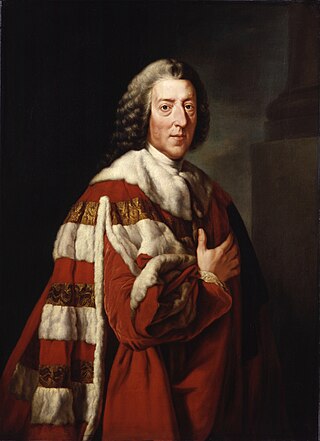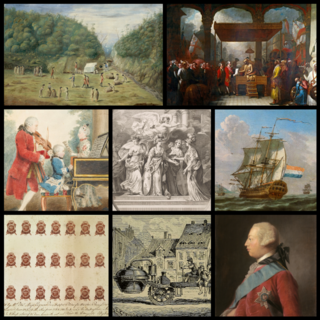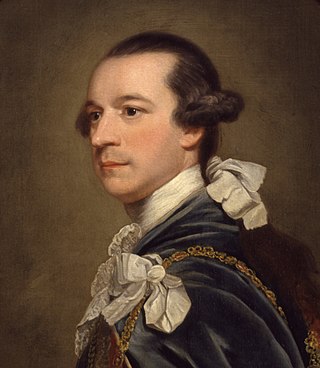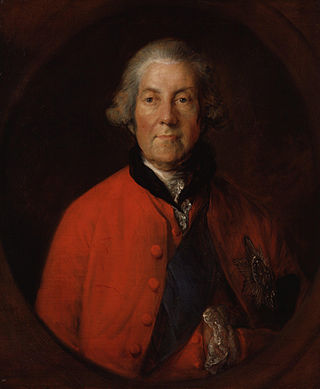Other years |
| Countries of the United Kingdom |
| Scotland |
| Sport |
| 1763 English cricket season |
Events from the year 1763 in Great Britain .
Other years |
| Countries of the United Kingdom |
| Scotland |
| Sport |
| 1763 English cricket season |
Events from the year 1763 in Great Britain .


William Pitt, 1st Earl of Chatham, was a British Whig statesman who served as Prime Minister of Great Britain from 1766 to 1768. Historians call him "Chatham" or "Pitt the Elder" to distinguish him from his son William Pitt the Younger, who also served as prime minister. Pitt was also known as "the Great Commoner" because of his long-standing refusal to accept a title until 1766.

1764 (MDCCLXIV) was a leap year starting on Sunday of the Gregorian calendar and a leap year starting on Thursday of the Julian calendar, the 1764th year of the Common Era (CE) and Anno Domini (AD) designations, the 764th year of the 2nd millennium, the 64th year of the 18th century, and the 5th year of the 1760s decade. As of the start of 1764, the Gregorian calendar was 11 days ahead of the Julian calendar, which remained in localized use until 1923.

The 1760s was a decade of the Gregorian calendar that began on January 1, 1760, and ended on December 31, 1769.

1763 (MDCCLXIII) was a common year starting on Saturday of the Gregorian calendar and a common year starting on Wednesday of the Julian calendar, the 1763rd year of the Common Era (CE) and Anno Domini (AD) designations, the 763rd year of the 2nd millennium, the 63rd year of the 18th century, and the 4th year of the 1760s decade. As of the start of 1763, the Gregorian calendar was 11 days ahead of the Julian calendar, which remained in localized use until 1923.

1759 (MDCCLIX) was a common year starting on Monday of the Gregorian calendar and a common year starting on Friday of the Julian calendar, the 1759th year of the Common Era (CE) and Anno Domini (AD) designations, the 759th year of the 2nd millennium, the 59th year of the 18th century, and the 10th and last year of the 1750s decade. As of the start of 1759, the Gregorian calendar was 11 days ahead of the Julian calendar, which remained in localized use until 1923.

John Stuart, 3rd Earl of Bute,, styled Lord Mount Stuart between 1713 and 1723, was a British nobleman who served as the Prime Minister of Great Britain from 1762 to 1763 under George III. He became the first Tory to hold the position and was arguably the last important royal favourite in British politics. He was the first prime minister from Scotland following the Acts of Union in 1707. He was also elected as the first president of the Society of Antiquaries of Scotland when it was founded in 1780.

Charles Watson-Wentworth, 2nd Marquess of Rockingham, was a British Whig statesman and magnate, most notable for his two terms as prime minister of Great Britain. He became the patron of many Whigs, known as the Rockingham Whigs, and served as a leading Whig grandee. He served in only two high offices during his lifetime but was nonetheless very influential during his one and a half years of service.

George Grenville was a British Whig statesman who rose to the position of Prime Minister of Great Britain, during the early reign of the young George III. He served for only two years (1763-1765), and attempted to solve the problem of the massive debt resulting from the Seven Years' War. He instituted a series of measures to increase revenue to the crown, including new taxes and enforcement of collection, and sought to bring the North American colonies under tighter crown control.

William Wyndham Grenville, 1st Baron Grenville, was a British Pittite Tory politician who served as Prime Minister of the United Kingdom from 1806 to 1807, but was a supporter of the Whigs for the duration of the Napoleonic Wars. As prime minister, his most significant achievement was the abolition of the slave trade in 1807. However, his government failed to either make peace with France or to accomplish Catholic emancipation and it was dismissed in the same year.

John Montagu, 4th Earl of Sandwich, PC, FRS was a British statesman who succeeded his grandfather Edward Montagu, 3rd Earl of Sandwich as the Earl of Sandwich in 1729, at the age of ten. He held various military and political offices, including Postmaster General, First Lord of the Admiralty, and Secretary of State for the Northern Department. He is also known for the claim that he was the inventor of the sandwich.

William Petty Fitzmaurice, 1st Marquess of Lansdowne,, was an Anglo-Irish Whig statesman who was the first home secretary in 1782 and then prime minister in 1782–83 during the final months of the American War of Independence. He succeeded in securing peace with America and this feat remains his most notable legacy.

John Russell, 4th Duke of Bedford, was a British Whig statesman and peer who served as the Lord Lieutenant of Ireland from 1757 to 1761. A leading member of the Whig party during the Seven Years' War, he negotiated the 1763 Treaty of Paris which ended the conflict. Bedford was also an early promoter of cricket and a patron of the arts who commissioned numerous works from prominent artists, most notably Canaletto.

Charles Jenkinson, 1st Earl of Liverpool, PC, known as Lord Hawkesbury between 1786 and 1796, was a British statesman. He was the father of Prime Minister Robert Jenkinson, 2nd Earl of Liverpool.

The Sugar Act 1764 or Sugar Act 1763, also known as the American Revenue Act 1764 or the American Duties Act, was a revenue-raising act passed by the Parliament of Great Britain on 5 April 1764. The preamble to the act stated: "it is expedient that new provisions and regulations should be established for improving the revenue of this Kingdom ... and ... it is just and necessary that a revenue should be raised ... for defraying the expenses of defending, protecting, and securing the same." The earlier Molasses Act 1733, which had imposed a tax of six pence per gallon of molasses, had never been effectively collected due to colonial evasion. By reducing the rate by half and increasing measures to enforce the tax, Parliament hoped that the tax would actually be collected. These incidents increased the colonists' concerns about the intent of the British Parliament and helped the growing movement that became the American Revolution.
Events from the year 1764 in Great Britain.
Events from the year 1792 in Great Britain.

John Stuart, 3rd Earl of Bute, served as Prime Minister of Great Britain during 1762–1763. He was the first Tory Prime Minister since the Harley ministry during 1710–1714 though his ministry was largely made up of Whigs.

The Grenville ministry was a British Government headed by George Grenville which served between 16 April 1763 and 13 July 1765. It was formed after the previous Prime Minister, the Earl of Bute, had resigned following fierce criticism of his signing of the Treaty of Paris with its perceived lenient terms for France and Spain despite Britain's successes in the Seven Years War. Grenville's government was made up largely of the same members as Bute's had. George III had a strong dislike of the new government because of the way they had replaced his favourite Bute.
The Anglo-Prussian Convention was agreed on 11 April 1758 between Great Britain and the Kingdom of Prussia and formalised the alliance between them that had effectively existed since the Convention of Westminster in 1756.